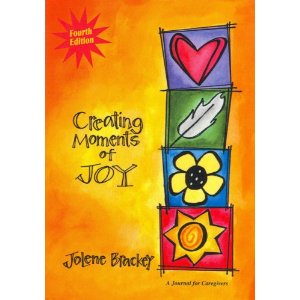Last week Jolene Brackey was in town giving presentations revolving around her book, Creating Moments of Joy. Brackey switched careers from interior designer to interior life enhancer, so to speak. She found her calling as an activities director for Alzheimer patients and now as a speaker, consultant, and trainer to dementia caregivers. Her book is the result of years of learning what works to assist dementia patients in daily living and how to bring connections and joy to them.
Creating Moments of Joy. Brackey switched careers from interior designer to interior life enhancer, so to speak. She found her calling as an activities director for Alzheimer patients and now as a speaker, consultant, and trainer to dementia caregivers. Her book is the result of years of learning what works to assist dementia patients in daily living and how to bring connections and joy to them.
Brackey gave a two-hour animated talk to a room full of relatives and friends of dementia patients. The audience ranged from those brand new to dementia and frightened to those like me who had years of learning the hard way. Oh, I wished I had Brackey’s book five years ago. She writes as an expert and friend, with short, easy to understand chapters full of examples—a style so important for those whose brains are stunned and confused by what dementia can bring (I’m talking about us caregivers!). Getting help like this can bring tears of relief.
On the bright side, Brackey was a whirling dynamo of advice, information, and anecdotes, who brought laughter and hope to her audience. One tidbit: “Stop correcting because you’ll make everyone’s life hell…If it’s not causing physical pain, leave it alone.” I think this works with teenagers, too.
Old hand that I am in Alzheimer’s care, I learned an exciting new way to bring joy to my mother. Brackey has a number of videos filled with gentle music and lovely scenes of nature or of families and children having fun that she said would soothe dementia patients as well as help them remember the beauty and happiness of life. Just talking and telling stories can be overwhelming or confusing to those deeper into dementia, but visions of life and familiar sounds can bring comfort and cheer.
Brackey told of the importance of sensory images in bringing back memories—sights of families enjoying picnics, sounds of running streams or birds or laughter, the taste of homemade chocolate chip cookies or lemon drops, the smell of cinnamon or their favorite perfume, the touch of fabric or a flower or a fishing bobber. In her book, she talks about simple pleasures, not family gatherings or lots of presents or busy outings, but things like pretty rocks, one flower, holding hands, a shoulder massage.
My mother can’t see well anymore, so family photos are useless. Using Brackey’s video idea, I’m going to make a video with the free Windows Movie Maker program on my pc (Macs have a version, too) of scanned still shots of old family photos. She’ll be able to see her sisters, 1950s Japan, her daughters as young children, her faraway daughter now, her unknown grown grandchildren as the babies she remembers. I’m really excited!
Jolene Brackey signed my copy of her book with this inscription: “Linda, write down who they are – bring joy.” I didn’t tell Jolene that I already did write it down. That now I am the keeper of my mother’s stories, and she still likes to hear them.




Linda, thanks for sharing this post. Our family has been confronted in the last year with an unknown to us previously dementia called Lewy body dementia, second only to Alzheimer’s. My husband’s brother has it, and he was originally diagnosed with Parkinson’s. This has been such a rapid progression that in the six months since we heard the word dementia he has lost all cognitive skills and the use of his legs and feet. It’s as if a large eraser came in and took away everything but his body. I’m going to look for this book because who knows how long a dementia patient can live! And if for a long time, joy may be all they have. Appreciate your thoughts on this topic as well.
Early onset Alzheimer’s Disease (diagnosis usually late 40’s) is devastating for the person and the loved ones. Our loved one lived for ten years….a large portion at the end stage, which came quickly, our time was spent trying to be creative in any way we could to bring some sense of pleasure. Often sensory, on occasion visual, it depended on the day. You need to be creative and understand what your loved one responds to, what may bring fear, each person being different in their decline and demeanor. Our Ann stayed as gentle a soul as she had always been, always with a smile. She lost her ability to communicate early in the disease (talk), we had smiles and body language to let us know if what we were doing was reaching her. She past peacefully far to young.
Linda, thanks for sirnhag this post. Our family has been confronted in the last year with an unknown to us previously dementia called Lewy body dementia, second only to Alzheimer’s. My husband’s brother has it, and he was originally diagnosed with Parkinson’s. This has been such a rapid progression that in the six months since we heard the word dementia he has lost all cognitive skills and the use of his legs and feet. It’s as if a large eraser came in and took away everything but his body. I’m going to look for this book because who knows how long a dementia patient can live! And if for a long time, joy may be all they have. Appreciate your thoughts on this topic as well.
Sherrey, I’m so sorry to hear about your brother-in-law. Dementia is a jaw-droppingly awful disease, and Trudy is right that it works differently on each person. Symptoms can change rapidly, personality can change, and mood can be by the moment so you have to think on your feet! Best wishes to you and your husband, Sherrey. In trying to learn all you can to help your brother-in-law, you will be his angels. Thanks for sharing your valuable experience, Trudy.
Linda, This is such a heartwarming post. Dealing with cognitive decline in a family member is one of the most difficult situations to endure. I saw it time after time in my nursing career. I love Jolene’s advice “If it isn’t causing physical pain, leave it alone.” I just finished reading Cherry Blossoms so I feel a connection to your sweet mother(review pending). You are doing such important work in promoting others to preserve the stories of loved ones. Thank you for featuring Jolene. I will refer her book to a dear friend of mine who’s husband is rapidly declining mentally from Alzheimer’s.